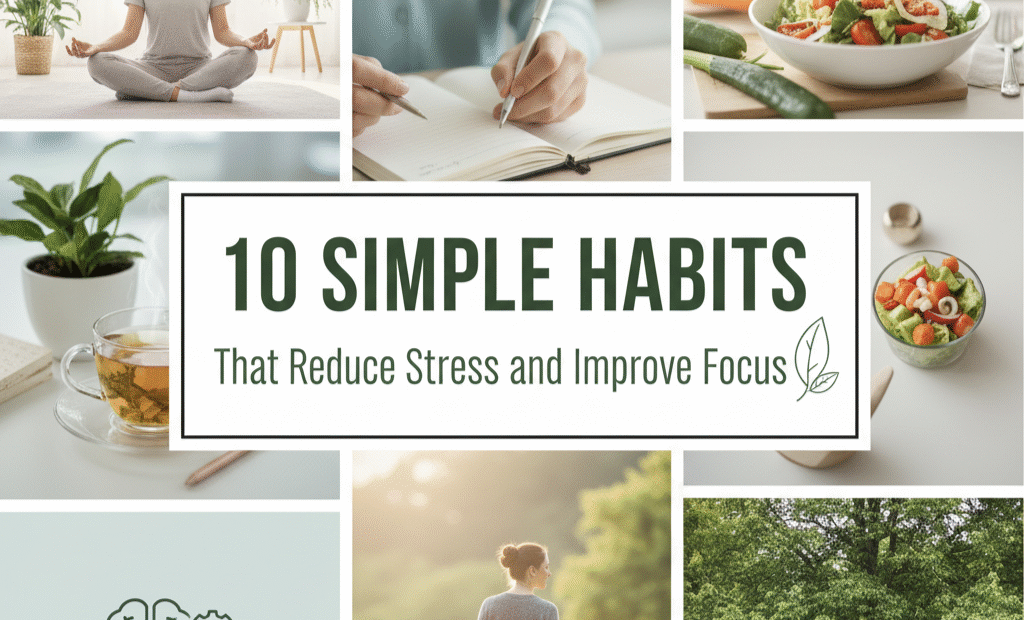In today’s fast-paced world, stress and lack of focus have become common struggles. Whether you’re a student, professional, or entrepreneur, staying calm and focused can directly impact your productivity and quality of life. The good news is that simple daily habits can significantly reduce stress while sharpening your focus. In this guide, we’ll break down 10 science-backed habits you can start practicing today to improve your mental health and overall performance.
Why Stress Management and Focus Matter
Stress doesn’t just affect your mind—it can harm your body, relationships, and even career. Chronic stress can lead to anxiety, high blood pressure, poor sleep, and decreased concentration. On the other hand, developing the right habits can:
- Lower cortisol levels (the stress hormone)
- Improve memory and focus
- Boost creativity and productivity
- Enhance emotional resilience
- Promote long-term well-being
10 Simple Habits to Reduce Stress and Improve Focus
1. Start Your Day with Deep Breathing
Taking just five minutes each morning to practice deep breathing or meditation can calm your nervous system and set the tone for a productive day. Studies show that mindful breathing reduces anxiety and improves attention span.
2. Practice Daily Gratitude
Writing down three things you’re grateful for each morning helps reframe your mindset. Gratitude reduces stress by shifting focus from problems to positive aspects of life, boosting resilience and optimism.
3. Exercise Regularly
Physical activity releases endorphins, your body’s natural mood boosters. You don’t need intense workouts—walking, yoga, or even stretching for 20 minutes can reduce stress and enhance focus throughout the day.
4. Prioritize Quality Sleep
Lack of sleep is directly linked to higher stress levels and poor concentration. Aim for 7–9 hours of quality rest. Create a bedtime routine, avoid screens before bed, and keep your room cool and dark.
5. Eat Brain-Boosting Foods
Your diet has a direct impact on stress and focus. Include foods rich in omega-3 fatty acids, antioxidants, and complex carbs such as salmon, walnuts, blueberries, and whole grains. Avoid excessive sugar and caffeine.
6. Limit Multitasking
Trying to do too many things at once increases stress and lowers efficiency. Instead, use the Pomodoro technique—work in focused 25-minute intervals followed by 5-minute breaks. This method enhances focus and reduces burnout.
7. Stay Hydrated
Even mild dehydration can impair concentration and trigger fatigue. Drinking 2–3 liters of water daily can keep your brain sharp and stress levels lower. Consider adding lemon or cucumber for an extra refreshing boost.
8. Create a Clutter-Free Workspace
A messy environment can overstimulate your brain and increase anxiety. Keep your workspace organized and minimalistic. This simple habit reduces distractions and allows you to focus better on important tasks.
9. Take Short Mindful Breaks
Stepping away from your desk to stretch, walk, or simply breathe can reset your focus. Research shows that short mindful breaks throughout the day improve mental clarity and lower stress levels.
10. Practice Digital Detox
Constant notifications and screen time can overwhelm the brain. Schedule at least 1–2 hours daily where you disconnect from your phone, social media, and emails. This habit improves focus, reduces stress, and enhances real-life connections.
Additional Tips for Stress-Free Living
- Set realistic daily goals and avoid overloading your to-do list.
- Incorporate nature walks—spending time outdoors reduces cortisol.
- Practice mindfulness or guided meditation apps like Headspace or Calm.
- Build strong social connections—talking with friends and family reduces stress.
FAQs
1. How quickly can these habits reduce stress?
Some habits, like deep breathing and mindful breaks, work instantly. Others, like regular exercise and improved sleep, may take a few weeks for noticeable results.
2. Can I do all 10 habits daily?
You don’t need to start all at once. Choose 2–3 habits to begin with and gradually add more as they become routine.
3. Do I need to meditate every day to reduce stress?
Even 5–10 minutes of mindfulness or meditation daily can significantly reduce stress. Consistency is more important than duration.
4. Are these habits scientifically proven?
Yes, many of these practices—such as gratitude journaling, exercise, and mindful breathing—are backed by research showing improvements in mental health and focus.
5. Can these habits replace therapy or medical treatment?
No, these are supportive lifestyle changes. If you experience chronic stress or anxiety, consult a healthcare professional for personalized guidance.
Final Thoughts
Stress and lack of focus don’t have to control your life. By adopting these 10 simple daily habits, you can significantly lower stress levels and sharpen your concentration. The key is consistency—small daily improvements compound into long-term well-being. Start with one or two habits today, and within weeks, you’ll notice a calmer mind and sharper focus.
Remember: Success comes from balance. Prioritize your mental health as much as your productivity, and both will improve together.









